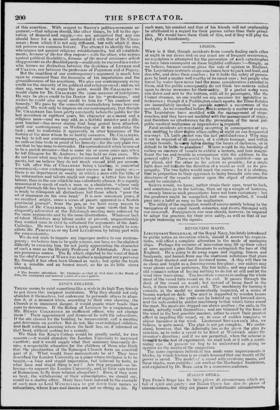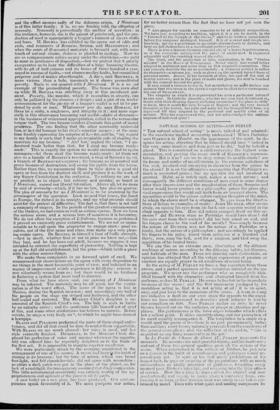ITALIAN OPERA.
THE French Stage has its little paces de circonstance, which are full of spirit and gaiety : our Italian Opera has also its pieces of circumstances, but they are pieces of unfortunate circumstances, and the effect savours sadly of the dolorous origin. I Messicani is of this latter family: it is, we are frankly told, the offspring of . necessity. Necessity is proverbially the mother of invention : in this instance, however, she is the parent of patchwork, and the pro- duction of need is appropriately a beggar's raiment of divers stuffs and hues. M. BOCHSA • has cobbled up the opera out of odds .and ends, and remnants of ROSSINI, SPOHR, and BEETHOVEN; and when the cento of ill-assorted materials is brought out, with some touch of natural shame, distress is pleaded in apology. Now we are as compassionate critics as any under the chandelier,—we yield to none in gentleness of disposition;—but we protest that it greatly exasperates us to hear the difficulties of a huge bouncing theatre, with its pit of half-guineas and its boxes of three hundred a year, urged in excuse of faults,—not chance medley faults, but committed prepense and of malice aforethought. A darn, said BRUMELL, is more vicious than a hole, inasmuch as it shows premeditated poverty. Such is our quarrel with I Illessicani. It is a we eed example of the premeditated poverty. The house was even shut up while M. Booms), was stitching away at this mendicant gar- ment. Poverty, like murder, which it resembles in atrocity, ean only be palliated by the absence of design ; and a plot of six weeks' announcement for the pie-nic of a beggar's wallet is not to be par- doned by gods or men. Whatsoever you do, says HORACE, let there be aunity, a singleness, and integrity in it ; and more espe- cially is this observance becoming and useful—:duke et decorum— in the business of unlicensed appropriation, called in the vernacular tongue theft. The two broom-venders illustrate this point of moral prudence. The one finding that the other constantly undersold him, at last did homage to his rivers superior success ; at the same time frankly expressing his surprise at it,—for, said he, "my regard to my family is such, that I make an invariable rule of stealing the materials for my brooms:' " Ah ! but," replied the other, " I un- derstand trade better than that, for I steal my brooms ready- made." This is exactly the system we would recommend to opera managers—let them steal the brooms ready-made : let them. not give us a handle of ROSSINCS rosewood, a twig of SPOHR.S a branch of BEETHOVEN'S cypress ; for brooms so ill-assorted will prove besoms of destruction, mid sweep the public from the house. Rather than this, we recommend them to lake down a good old opera or two from the dustiest shelf, and produce it as the work of any Signor Crotchetiani in the orchestra. To robbery we are not so prudish as to object ; but robbery and murder, as heard in I Messicani, exceed. our liberal toleration. Above all, let no more be said of necessity—which, if it has no law, has also no quarter. The plea of necessity for an I Messicani is to be answered by the circumspice of the spectator. Look around that house the finest in Europe, the richest in its receipts, and say what grounds should exist for the pretext of difficulties. The fact is, that there is not half a company of singers. In the periods of the greatest embarassment of the theatre, we had comic as well as serious operas. Now we have the serious alone, and a serious bore of sameness it is becoming. We do not allow the exception of L Itahana, because as performed it proved an eminently grave entertainment. We are not so unrea- sonable as to call upon the proprietor to engage stars : good vo- calists, not of the first name and class, may make up a very pleas- ing comic opera. De BEGeris, in himself a host of buffo strength, —:first in merit, whether first or not in price we know not,—him they had, and he has been cut adrift, because we suppose it was intended to retrench the superfluity of pleasantry. Nothing is kept up at the full old establishment, but the price—which holds a place with the other serious things.
We make these complaints in no forward spirit of cavil. We commenced our observations on the opera with every disposition to see things in the most favourable point of view, and indulged in art augury of improvement which experience is falsifying : censure is now reluctantly wrung from us ; but there would be no kindness in flattering a system that must tend to disaster.
From what we have above said, our opinion of I Messicani may be inferred. The materials may be all good, but the combi- nation is of the worst effect. The scene of the opera is laid in Mexico, during the Spanish invasion ; and accordingly one half of the people on the stage are striped and feathered, and the other half scaled and casketed. The Mexican Chief's daughter is en- amoured of the Spanish Chiefs son. The lady is slain in battle by an unlucky arrow ; and the gentleman kills himself out of grief at this, and some other misfortunes too tedious to narrate. Before suicide, he 'sings a very lively air ", to which he might have danced a hornpipe. Btasis and PISARONI performed the parts of these stupid unfor- tunates, and did all that could be done to render them supportable. With BLASIS we are much pleased: her voice is good, and her style correctly finished. DONZELLI, in the Mexican Chief, dis- played his perfection of voice and manner whenever the opportu- nity was offered him: he especially delighted us in the finale of the first act. It is impossible to imagine superior excellence. We were particularly struck by the economy manifested in the arrangement of one of the scenes. A moon had been is the habit of shining in its heavens ; hut the time of action, which was broad foot-light, and full chandelier-tide, did not agree with moonshine ; so either a dark patch wee put in the place of the planet, or, for lack of arushlight, the transparency assumed that dingy complexion. This little astronomical eccentricity was entirely worthy of the ap- propriateness and aptitude of the piece in ail its parts.
A new ballet on a new plan, has been produced. Our contem- poraries speak favourably of it. We must postpone our notice, for no better reason than the fact that we have not yet seen the piece.
4' Airs proper for suicide we conceive to he of difficult composition. We have one, according to tradition, wjsich it is a sin to doubt, in the " Farewell.to the Nymph of the Grove," said to be written immediately before the composer destroyed himself. It is of a sweet and simple me- lancholy, apt for a gentleman in moderate circumstance of distress, and bent on self-destruction in a woodbined cottage parlour.
There is also a famous German suicidal air, of a heavy lugubriousness, as if the composer anticipated the pains of oxalic acid. It expresses admirably well the rumbling woes of the colic.
The third, and the perfection of lyric imagination, is the " Ombra adorata" in the Romeo of ZINGARELLI. Never surely was sound better adapted to sentiment and scene than in this exquisite conception. One can scarcely describe the air as melancholy ; a heavenly ecstacy is rather its character—a solemn joy, such as glows on the upward.turned faces of pictured saints. .Romeo, in his foretaste of bliss, has cast off the coil of mortal sorrows; and in the place of death and gloom, his soul is touched with the content beyond the grave. It may sound a treason to say it, bat nevertheless we mist declare our opinion that this scene in the opera is superior in effect tothe correspond- ing one Of SHAKSPEARE. The chapelry in which it is represented has even a particular interest to our eyes. In Catholic churches, who has not seen such devotional re, treats with their sleeping figures reclining on couches? the place so stilly so hush, that it seems the very Temple of Repose ; and the very inward thoughts of the visitor, too rude and noisy for the tranquil little lane, are repressed till they respond to the profound and marble calm of all around. Who has experienced this, and not acknowledged the sublime impress of hallowed quiet ?



















 Previous page
Previous page